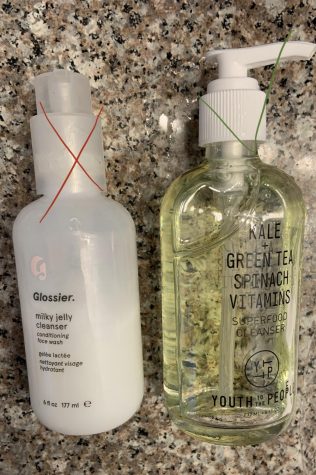Face The Reality of Skincare
March 3, 2020
 The well-cycled phrase in advertising “smell sells” epitomizes the downfall many skincare fanatics experience when searching for effective products. In recent years, marketing for beauty products has emphasized the experience: expensive packaging, addicting fragrances, and creams of rich, silky consistency. These companies promote the notion that cleansing one’s face should be an indulgent activity instead of a chore, complete with synthetically derived bells and whistles… that actually don’t enhance anything at all. In fact, these added ingredients may do more harm to your skin than good.
The well-cycled phrase in advertising “smell sells” epitomizes the downfall many skincare fanatics experience when searching for effective products. In recent years, marketing for beauty products has emphasized the experience: expensive packaging, addicting fragrances, and creams of rich, silky consistency. These companies promote the notion that cleansing one’s face should be an indulgent activity instead of a chore, complete with synthetically derived bells and whistles… that actually don’t enhance anything at all. In fact, these added ingredients may do more harm to your skin than good.
The harsh reality is that essential oils and fragrant aroma compounds, fixatives, and solvents, commonplace in today’s skincare formulations, are extremely irritating for the skin. These ingredients can damage the skin’s protective barrier function, which locks in moisture and nutrients while blocking irritants. “I cannot stress enough how important it is to take care of your skin,” says Dr. Jackson, a dermatologist at Skin MD Peabody, “Unfortunately there are just so many roadblocks in the way that people don’t take into account.”
Chemical analysis has revealed that “well known allergens from fragrance mixes are present in 73% of cosmetic products,” meaning that it is difficult to avoid exposure (US National Library of Medicine). This problem is further complicated by the fact that many products that pride themselves on being “natural” and “fragrance free” do, indeed, contain fragrance ingredients used as preservatives that are glossed over by regulators. This is especially unfair for individuals with sensitive skin, or sufferers of conditions such as rosacea or eczema, as these harmful ingredients may lead to burning or itching sensations.
“I didn’t really start looking at ingredient lists until I found out I had rosacea,” admits Dani Surpitski, an Ipswich High School senior, “Now I always check them for words I can’t pronounce, because chances are it’s going to be some chemical that I don’t want on my skin.” Surpitski also strays away from harsh facial exfoliators, another hot item on the skincare market. Abrasive scrubs, such as those containing coffee grounds, can rip micro-cuts in the skin and lead to dryness and irritation. In response to this, the oil glands overwork to produce more oil to help hydrate the skin. “I was frustrated when my products didn’t work like they advertised, so now I lean more toward products from Youth to the People, Farmhouse Fresh, and Environ, which have vitamins and peptides in them,” says Surpitski.
Unfortunately, the beauty industry continues to take advantage of those who prioritize aesthetic value and sense of luxury over all things practical and affordable. Cult classics that social media influencers swear by, such as Glossier’s milky jelly cleanser, are chock full of fragrance—rose water, in this case—and multiple solvents, surfactants, and emulsifiers. Other products have ridiculously high price points and promise incredible results with nothing to back them up other than a faint whiff of lavender. Oftentimes, it is difficult to distinguish quality skincare products from the mediocre majority. The trick is simple: be smart about what you put on your skin by researching in advance.
